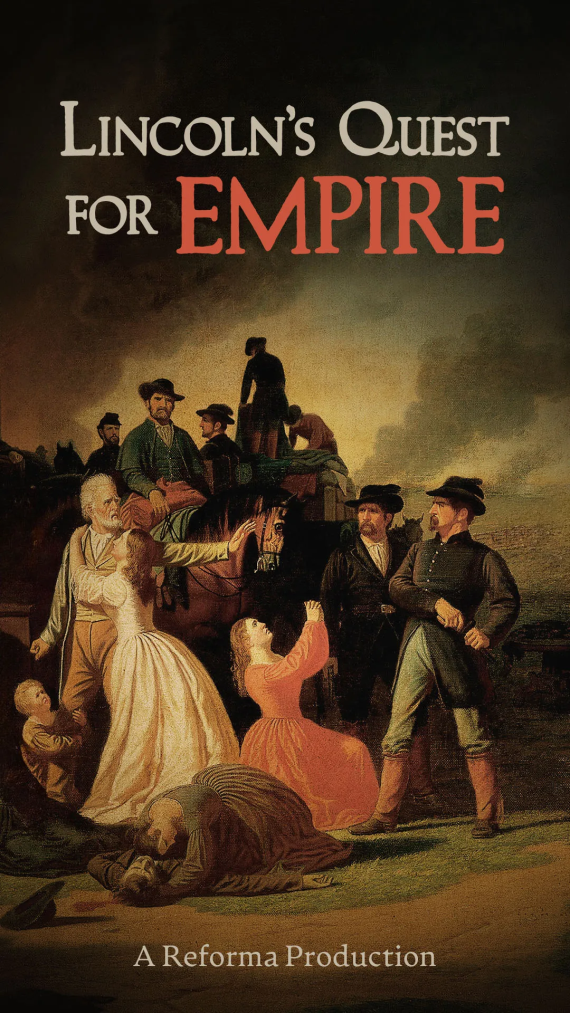Many Americans cherish the image of Honest Abe Lincoln: a lad born in humble circumstances who succeeded by hard, sleeves-rolled-up work; became President, fulfilling his lifelong goal of freeing the slaves, meanwhile saving government of, by and for the people; and was martyred and wafted to Heaven by angels.
This image is folklore, no more related to the facts of Lincoln’s career than the legend of Paul Bunyan, but the image seems ineradicable. For many it serves as the cornerstone of their identity as members of a peculiarly virtuous American nation, as a substitute for religion and cultural heritage. I say folklore and not myth because a genuine myth rises from the people, but folklore is an artificial commercial product.
There has always been a minority who have questioned the folklore. They have pointed out that Lincoln was a wealthy corporation lawyer and a crafty and pathologically ambitious politician, who had an ambiguous and opportunistic relationship to slavery and Christianity. Who carried out a cruel war of invasion and conquest against other Americans, countenancing total war against civilians. Who caused a war that he thought would give him a short and easy victory but led to the greatest bloodbath in American history. Who turned loose the slaves without any interest in their survival or progress. Who installed the rule of Big Business in U.S. affairs. And who violently changed the American regime from a Union into a centralized empire.
There are some, like George Will and James McPherson, who admit that Lincoln made a revolutionary change in our country but praise that as a good thing. But many of us who are dissatisfied with living in a decaying American empire think that Lincoln revolution is the key to many of today’s ills and that Americans must obtain a realistic view of his history in order to recover a healthy course.
The anti-Lincoln argument has created a great literature in the past few decades. Dr. Thomas DiLorenzo’s works, The Real Lincoln and Lincoln Unmasked are seminal in this effort. The poet Edgar Lee Masters’s expose’ from the early 20th century, Lincoln-The Man, has been republished. We also have Charles T. Pace, Lincoln as He Really Was; Jonathan White, Northern Opposition to Mr. Lincoln’s War; John A. Emison, Lincoln Uber Ales; Howard White, Rebirthing Lincoln; and recently Walter D. Kennedy and Al Benson, Lincoln, Marx, and the GOP, and Kennedy’s Lincoln: Non-Christian President. I understand there is a book in process with new information about Lincoln’s less than philanthropic treatment of the slaves acquired from his wife’s family.
“Lincoln’s Quest for Empire,” a new two-hour documentary, is a splendid addition to the true Lincoln case. One viewer writes: “I didn’t think anyone in our times had the courage to tell the truth on so many levels.” Another says: “You will never find anywhere a superior presentation in word and picture of what happened in those {Lincoln] years and its questionable results.”
The documentary was produced by the Seppi family of California–a long project based on their own knowledge and resources. They are neither professional historians nor professional documentary makers, but they have mastered both crafts superbly.
There are beautiful pictorial selections and a dozen extended interviews covering every varied aspect of the Lincoln case with a very appropriate theme “Lincoln’s Quest for Empire.” Among the many interviewed are people who will be recognized by most readers of this site–Donald Kennedy, Donald Livingston, Paul Graham, the Rev. J. Steven Wilkins, the Rev. Douglas Wilson, Kirkpatrick Sale, and others.
Here is a good and unique presentation of those troubled years of American history, the long effects of which trouble many of us today. The DVD can be acquired at https://lincolnsquestforempire.com and other formats will become available.







It is enjoyable to read Dr. Clyde Wilson’s articles and essays. The Lincoln folklore is a disease within the GOP and they haven’t a clue. It’s difficult to watch/listen to pundits who label themselves conservatives and yet have a love affair with Lincoln.
Looks professional; worth a shot.
Wait…I saw the trailer. Nevermind; how is a Feudal Christian empire better than a Lincoln one? invoking Jefferson and Washington is laughable, since they had non-Christian views, like Lincoln.
Hi,
Being one who was absolutely raised on the Lincoln, the greatest man on Earth, story and in Manchester UK we have a statue to him in Abraham Lincoln Square, paid for by public subscription in the 19th century, I read your article in astonishment. BUT I will read the books and articles you recommend in an attempt at re-education and historical exploration.
One thing the Abbeville Institution has taught me is to look again at the re-construction period with a fresh eye.
Thank you for your article.
Your curiosity is commendable. Most just shriek SLAVERY! and slink away.
Even though I’m incontrovertibly from Southern stock, I received no education about the War. Lincoln was assumed along with Washington and Jefferson, then it was on to other things. I was born and raised with the Spirit of ’76, though, and the more that is learned of Lincoln the farther the relation appears.
Another interesting read is The Real Lincoln by Charles C. Minor, from 1904 with various reprints. Minor was a teacher before serving with some distinction with the Confederate army throughout the War and resumed teaching afterwards. His book is derived from the public record and includes footnotes and annotation.
No respect for Lincoln
Nearly destroyed the nation single handed
I think the northern bankers wanted the South and Lincoln was their cat’s paw
Abolition of slavery was the issue hyped to the idealists who bought it hook, line and sinker